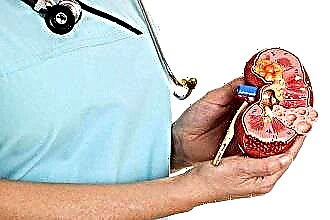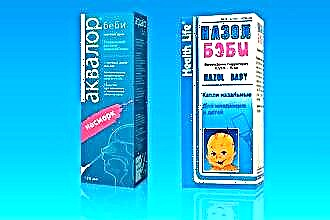Angina is an infectious disease caused by certain types of pathogen, streptococcus or staphylococcus. Its source is a sick person or carrier. Due to the airborne and alimentary transmission route, infection is carried out quite easily, which determines the infectiousness and widespread spread of this disease.
 Angina is characterized by a severe course, severe intoxication. In addition, the disease is dangerous for its complications. Among the early complications are tonsil abscess and purulent lymphadenitis, requiring surgical intervention. Long-term consequences include severe damage to the heart and kidneys. In this regard, there is an acute question of how to prevent the development of the disease and its complications.
Angina is characterized by a severe course, severe intoxication. In addition, the disease is dangerous for its complications. Among the early complications are tonsil abscess and purulent lymphadenitis, requiring surgical intervention. Long-term consequences include severe damage to the heart and kidneys. In this regard, there is an acute question of how to prevent the development of the disease and its complications.
The problem is even more urgent when there is a re-infection. In some cases, children may suffer from this disease several times a year.
Infection prevention
Preventive measures have several directions:
- Elimination of the impact of pathogenic microorganisms on the body;
- Carrying out activities aimed at increasing the immunity of the child.
A patient suffering from angina is contagious when the first signs of the disease appear. Without adequate treatment, it remains dangerous to others for another two weeks.
After starting to take the appropriate antibiotics, the danger to others remains for another two days from the start of taking the drug. In the future, the activity of these pathogenic pathogens decreases, the patient becomes less dangerous.
Since treatment most often takes place at home, it is necessary to take these facts into account to prevent the spread of the disease among relatives. To exclude a child's infection with angina, it is necessary to limit his contact with potentially dangerous carriers of the infection.
In addition, children's toys with traces of infected saliva and common items are quite dangerous. In order to prevent re-infection of the child, it is necessary to properly disinfect the surrounding objects. Conducting sanitary measures, as well as following individual hygienic requirements, will exclude not only the development of diseases such as tonsillitis, but also other intestinal infections transmitted by the alimentary route.
Causes of decreased immunity
 It is not often that children have the opportunity of contact with patients with angina. Speaking of frequent cases of tonsillitis, it is often implied an exacerbation of chronic tonsillitis, which can be caused by a variety of pathogens that are activated by hypothermia or against the background of ARVI. In order to prevent the development of symptoms in this case, sufficient immunity of the patient plays an important role.
It is not often that children have the opportunity of contact with patients with angina. Speaking of frequent cases of tonsillitis, it is often implied an exacerbation of chronic tonsillitis, which can be caused by a variety of pathogens that are activated by hypothermia or against the background of ARVI. In order to prevent the development of symptoms in this case, sufficient immunity of the patient plays an important role.
Decreased immunity may be due to the following:
- the presence of pathology of the ENT organs;
- violation of sleep, rest;
- insufficient and unbalanced nutrition;
- existing concomitant serious illnesses and foci of chronic infection;
- inhaled air pollution;
- reduced psycho-emotional background.
General strengthening activities
Thus, with frequent tonsillitis and persistent illnesses, it is necessary to carry out general strengthening measures that contribute to an increase in immunity. It is important for the child to adhere to the daily routine, including adequate sleep, time for games. Walking in the fresh air has a positive effect on strengthening the immune system. It is especially useful to carry them out in a forested area, where the air is cleaned of city dust and exhaust gases. Gymnastics, light exercise or sports also help to increase endurance, positive tone.
Tempering is of great importance for constantly ill children prone to frequent tonsillitis. Before carrying out these procedures, it is necessary to consult a pediatrician. Despite the general positive value of this method of increasing immunity, such measures have limitations: they are contraindicated in the acute period of the development of the disease.
For a healthy lifestyle, you also need a fortified diet with a sufficient amount of protein, both animal and plant origin. The use of vegetables, fruits, fish and seafood, beekeeping products contributes to the increase of immunity.
Aromatic oils and herbal medicine, including the use of tincture of ginseng, echinacea, eleutherococcus, also helps to increase the body's resistance to various pathogenic influences.
Comorbidity
An important part of the complex treatment of continuously ill children is their examination in order to identify concomitant pathology and, subsequently, sanitation of foci of chronic infection. The most common concomitant diseases that contribute to the development of angina in a child are the following pathological conditions:
- chronic sinusitis, otitis media, pharyngitis;
- enlarged adenoids;
- cardiovascular pathology, disturbances in the work of the gastrointestinal tract;
- pathology characterized by reduced immunity (tuberculosis, viral hepatitis, HIV, helminthic invasions);
- foci of chronic infection;
- oncopathology;
- diabetes.
Long-term treatment with antibiotics and corticosteroid drugs leads to a decrease in immunity.
 Enlarged adenoids can play a significant role in the development of angina. Their growth contributes to the narrowing of the auditory tube from the outside, creating the prerequisites for the development of otitis media or sinusitis. Despite the important role of adenoids in the development of local immunity, the removal of these formations can prevent the involvement of the pharyngeal ring in the process of tonsils and the development of frequent tonsillitis.
Enlarged adenoids can play a significant role in the development of angina. Their growth contributes to the narrowing of the auditory tube from the outside, creating the prerequisites for the development of otitis media or sinusitis. Despite the important role of adenoids in the development of local immunity, the removal of these formations can prevent the involvement of the pharyngeal ring in the process of tonsils and the development of frequent tonsillitis.
Any long-term current disease is accompanied by a decrease in immunity. Consequently, the presence of cardiovascular pathology in the stage of decompensation, exacerbation of cholecystitis or enterocolitis, systemic diseases, endocrine and renal pathologies also lead to a decrease in immunity and an increase in the risk of infection with pathogenic microorganisms. Timely and obligatory consultation of the relevant specialists, the implementation of their recommendations, will also contribute to the strengthening of general immunity.
The situation is similar with hidden foci of infection or the presence of helminthic invasions that require additional laboratory clarification. Despite the absence of clinical symptoms, these pathological processes must be identified in case of persistent illnesses of the child. Subsequently, treatment of helminthiasis and sanitation of foci of infections should be carried out. In the absence of toothache, an appeal to the dentist should be aimed precisely at finding the source of the latent infection.
Environmental background
In a child with frequent respiratory diseases or sore throats, it is necessary to study the ecological background. An obvious fact is that staying in dusty and polluted areas contributes to a deterioration in health, the development of various pathological conditions and, above all, occurring with the defeat of the respiratory tract. At the same time, staying in clean air, in a forest belt or on the coast, improves health, prevents the development of pathological processes. Spa treatment, balneological procedures in this case are very useful for a child with frequent sore throats.
To strengthen local immunity is important not only the absence of pathological impurities in the air. You should also avoid dry and warm air, in which pathogens feel as well as possible. This is the kind of air  has a damaging effect on the mucous membranes of the nasopharynx.
has a damaging effect on the mucous membranes of the nasopharynx.
Dry mucous membranes facilitate the attachment of pathogenic bacteria and viruses. To exclude these negative factors, it is recommended to constantly carry out wet cleaning in the premises, ventilate them, moisturize the mucous membranes with the help of saline solutions. In winter, when the dryness of the air in the room is caused by heating devices or the operation of central heating, the use of air humidifiers is indicated.
The use of medicines
In the prevention of frequent sore throats, the constant use of antiseptic solutions for rinsing the mouth is unreasonable.
Uncontrolled use of these funds can contribute to the development of microflora resistant to various antibacterial agents.
To increase the body's defenses, drugs that have an immunostimulating effect can also be used. The most popular of them are: Bronchomunal, Immunal, Ribomunil, Timalin.
In severe cases, when a child has been infected with a group A beta-hemolytic streptococcus several times a year, confirmed by laboratory tests, bicillin, a penicillin antibiotic with a prolonged effect, can be used to prevent angina and rheumatism.
Thus, with constant illness of the child and frequent tonsillitis, it is recommended to carry out the following measures aimed at eliminating infection and increasing immunity:
- compliance with the rules of personal hygiene;
- balanced fortified food;
- adherence to the daily routine;
- refusal of self-medication, that is, it is necessary to exclude the uncontrolled use of antibiotics and other drugs that reduce immunity;
- treatment of concomitant diseases and foci of chronic infection;
- the use of phytopreparations and medicines that have an immunostimulating effect;
- if necessary, the use of bicillin prophylaxis.

Faced with frequent sore throats in a child, it is necessary to conduct a comprehensive examination to exclude concomitant pathology that affects immunity. Along the way, you should carry out all the necessary sanitary and hygienic measures. It is a comprehensive solution to this issue that will lead to noticeable results.




